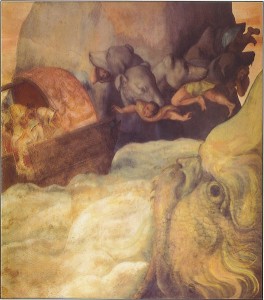In our last blog post on How to Write a Pageturner Novel– “How the ‘Okay, I’m in’ Scene Advances Your Novel” –we discussed how to wrap up the introductory chapters of your novel most effectively.
That brings us to the Midsection of your novel. In a screenplay, this would be called Act 2. For our purposes, we can call it Act 2-A because–as you’ll see–the Midsection of a well-constructed novel (or screenplay) is divided into two distinct sections.
In the first half of the Midsection, your hero struggles to reach his goal. But his efforts lead only to frustration.
Think about Odysseus, the prototypical novelistic hero. His goal was to return home but he was frustrated at every turn–by shipwreck, the failings of his companions, monsters, a lovelorn nymph, and cannibals on the warpath. Whew! (It was the Raiders of the Lost Ark of its day.)
All of this frustration, this effort against overwhelming odds, creates tension. These Act 2-A plot complications–with the hero needing to resourcefully deal with all manner of opposition–mean a huge amount of stress for the character – and that’s great for story.
This is why it’s helpful to develop an author persona that is comfortable with being unkind to your hero. “Nice guy” authors often want to let their literary creations enjoy only mild opposing forces. In real life, it’s great to be kind: you’re the kind of friend I want! Seated in the writer’s chair, let your characters struggle!
Why? Because it’s unfair to your readers to give your characters a life on Easy Street. Happy characters facing only the mildest of challenges make for a boring reading experience. By the same token, it’s also unfair to your splendid fictional creations–because you don’t let them flex all of their resourceful muscles.
As your reader works through Act 2-A, he will–identifying with the hero–constantly hope the hero’s plan to resolve his challenges works. But the hero’s plan cannot work in the Midsection–at least, it cannot work for very long, or flawlessly. That’s because, once it works in a way that resolves the hero’s main concern, the story tension is dissipated, and the reader will have no compelling reason to read further.
That’s why authors who are too kind to their heroes do readers a disservice.
Your reader wants to lose himself/herself vicariously in the hero’s struggle, and to grow with the hero as he learns what it takes to win on the hard road to victory–a victory that will be all the sweeter if hard won. Don’t deprive your reader of this delightful journey by providing shortcuts that bypass “insightful moments” and “realizations of how to be resourceful”–those surprise and delight moments that make a book buzz-able!
Next post on writing: how the above works in some famous novels.
Happy Writing!


1 Comment
Great advice! Thank you.
I would feel deprived and get bored quickly if the hero does not meet some difficulties or even failures on the way!! It makes for interesting reading and might even relate to the reader!